It doesn’t happen often, but it happened in Mumbai, India. Tears of joy came to me as I stood outside the Mahatma Gandhi museum in Mumbai. Mani Bhavan — and India — are among the many places on Earth I’ve always wanted to visit. To finally make it there overwhelmed me with gratitude and humility.
As we travel around India, it occurs to me that so much Gandhi’s global message has been lost. His life was devoted to swaraj, or self-rule – independence from the British Empire using non-violent civil disobedience. Gandhi was a London-educated lawyer who rejected excess to focus on political ethics. It’s the political ethics part that seems to have gotten lost in time.
Political ethics. Imagine that.
Gandhi was assassinated in 1948, shortly after India gained her independence in 1947. Today India has the largest democracy on the planet.
I first learned about Gandhi in a college philosophy class. If Ayn Rand’s objectivism is based on rugged individualism to climb to the top of the heap, Gandhi’s style was rugged individualism with individual responsibility towards fellow man, while not stepping on any toes — at its core.
That’s actually my main gripe with Rand: she never considers the evil greedy nature of the creme-de-la-creme. She overlooks too many ruthless power-hungry people who have no ethics, just as in the communist country she fled.
One of my favorite Gandhi quotes: “The rich cannot accumulate wealth without the co-operation of the poor in society. If this knowledge were to penetrate to and spread amongst the poor, they would become strong and would learn how to free themselves which have brought them to the verge of starvation.”
Objectivism? Trickle-down economics? The military industrial complex? Land-grabbing Russia?
Political ethics. An antidote to so many ills.
Like many countries, India has plenty of beggars and billionaires. She is a democracy with current religious and economic struggles because, like everywhere, egos get too big. Human nature can easily revert to the selfish mantra: I, me, and mine.
The religious and political divides I see in my own country are borne of the same ills: greed, ego, and that selfish mantra.
In India, four workers can be hired for the price of one employee in the USA. I recently saw a video for a hiring event by Qatar Airways in Mumbai. It was incredible. Thousands of people showed up. They came from long distances for a chance to get their resume in front of a hiring manager. There was a crush of people wearing long-sleeved ironed shirts and ties, polished shoes, holding resumes, hoping against hope they might get a job. (The last couple of videos on an outside article are the most heartbreaking.)
Indians want to work. They want the income and the dignity it provides. They will work for less pay, because in the 21st century, unfortunately, India is still being pillaged.
Economic disparities are common worldwide. Our readers know we helped a lot of people in the Philippines during the pandemic, in addition to the indigenous Ati tribe. One of my most successful efforts to help people was getting two friends jobs. I’ve never mentioned that on this blog, but more than seven months since they started working, they are both still working, still earning a steady salary, whereas before they had no income. People want to work. People want to provide for their own basic needs in a dignified way.
Here is another Gandhi quote on how to level the playing field without dispossessing the wealthy: “… all the capitalists will have an opportunity of becoming statutory trustees. But such a statute will not be imposed from above. It will have to come from below. When the people understand the implications of trusteeship and the atmosphere is ripe for it, the people themselves, beginning with gram Panchayat (village politicians), will begin to introduce such statutes. Such a thing coming from below is easy to swallow. Coming from above, it is liable to prove a dead weight.”
If only there were someone like Gandhi, Gandiji, Bapu, alive today. Someone who was willing and able to point people beyond the ‘I, me, and mine’ mentality.
Mani Bhavan
At Mani Bhavan in Mumbai, there is a library filled with Gandhi’s works, reading exhibits, and you can see the room where Gandhi actually stayed: his mattress, his spinning wheels. That area is sealed off.
There are famous pictures of Gandiji standing on the third-floor balcony, and I felt a good energy standing in the same spot.
Mani Bhavan was a private home, but also the base for Gandhi’s political movement in the early years through 1934.
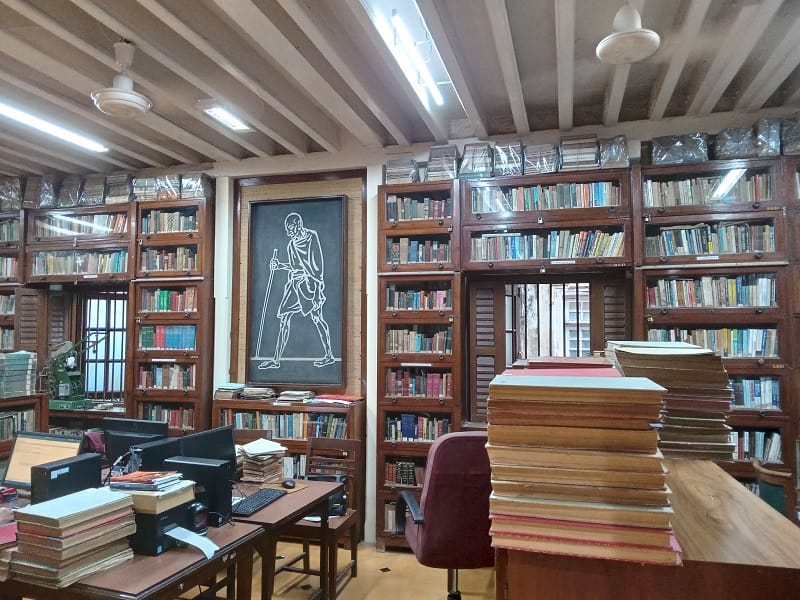
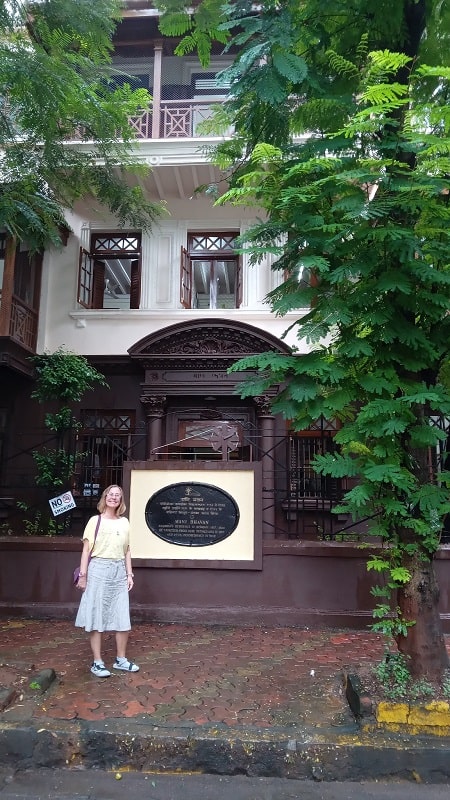

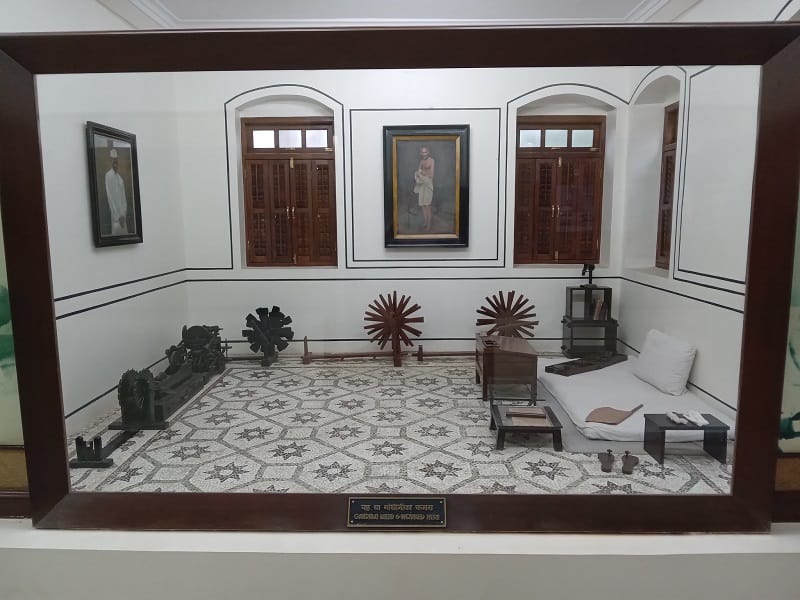
Admission to Mani Bhavan is free, but donations are encouraged as you exit.
Agakhan Palace
Gandhi’s independence demands really pissed off a distracted British Empire during World War II, and so the British threw him in jail, along with his wife and secretary. This prison was actually in a palace built by a sultan – the Agakhan Palace in the city of Pune.
Today the palace is a memorial to India’s national freedom movement. Entry is 300 rupees ($3.75) for foreigners.
Gandhi, Kasturba Gandhi (wife), and Mahadevbhai Desai (secretary and best friend) were imprisoned at the palace from 1942 to 1944. Kasturba and Desai both died there.
The rooms are now exhibits for Gandhi’s “Quit India” movement. The room where Kasturba died is sealed off. Kasturba’s and Desai’s ashes are memorialized here.
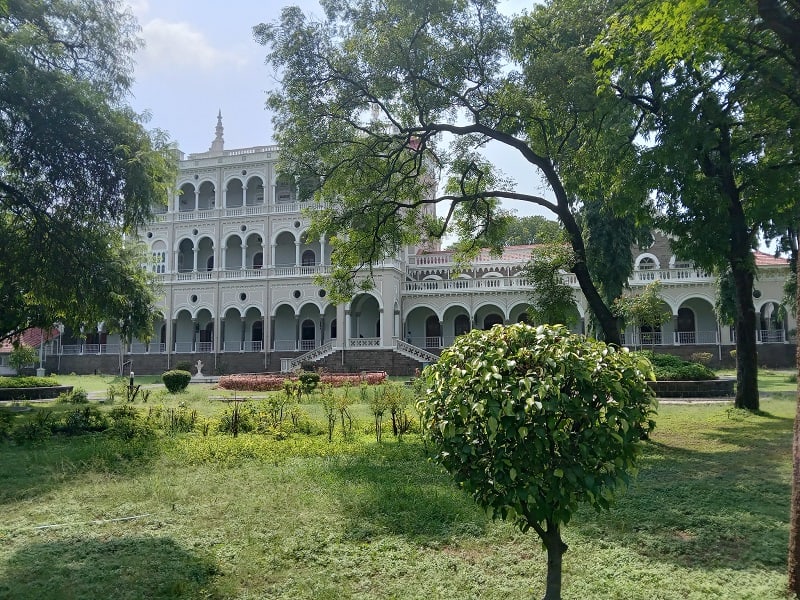
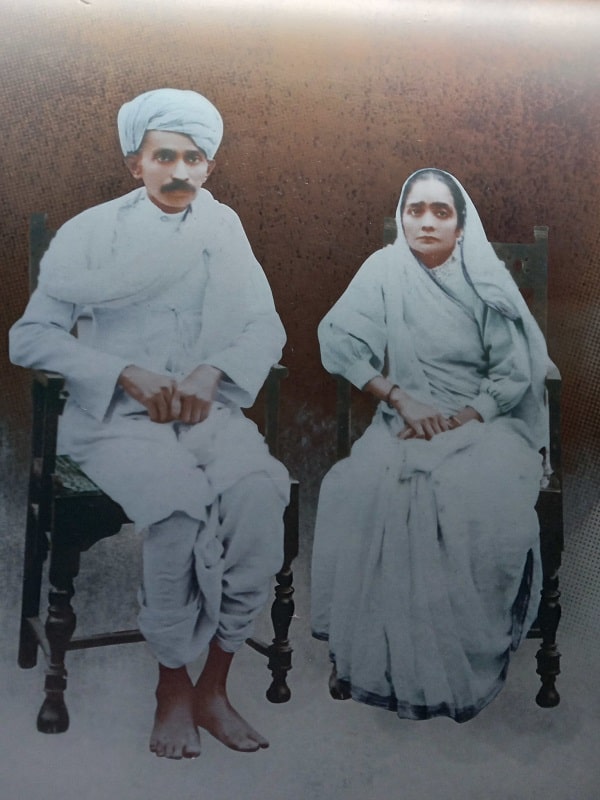
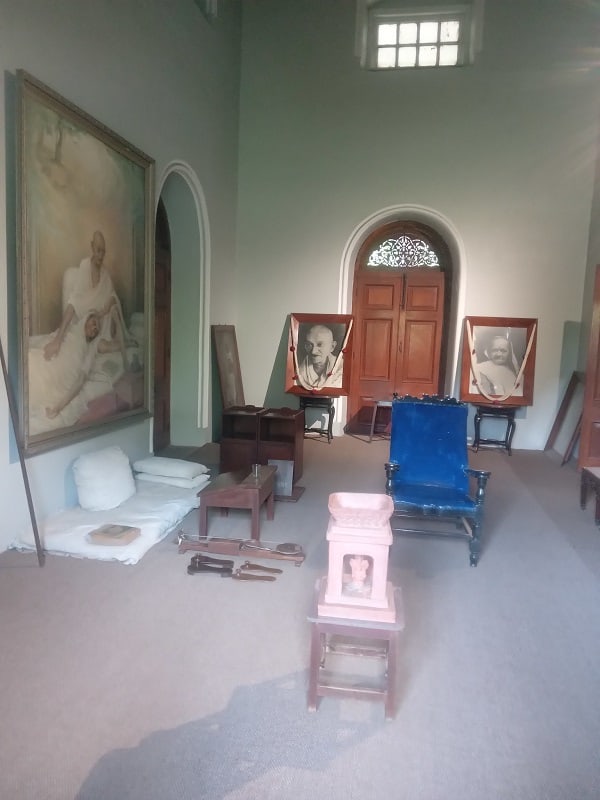
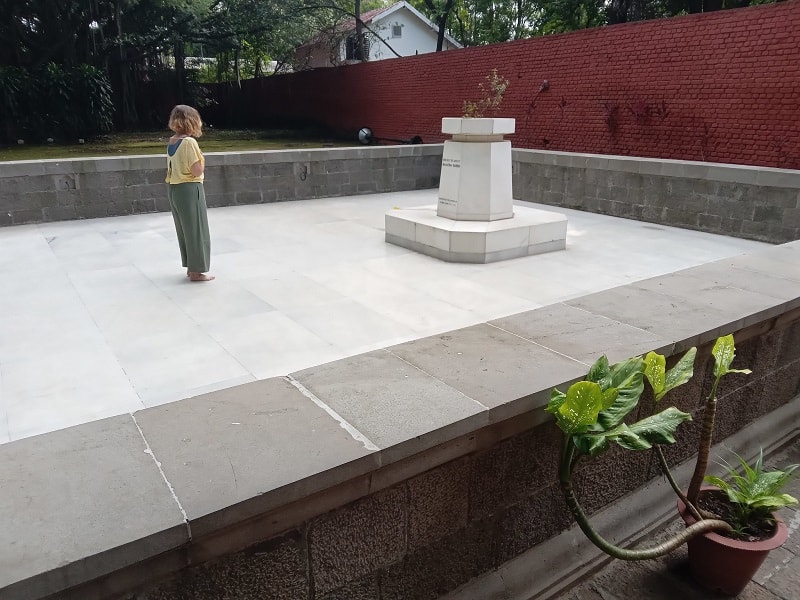
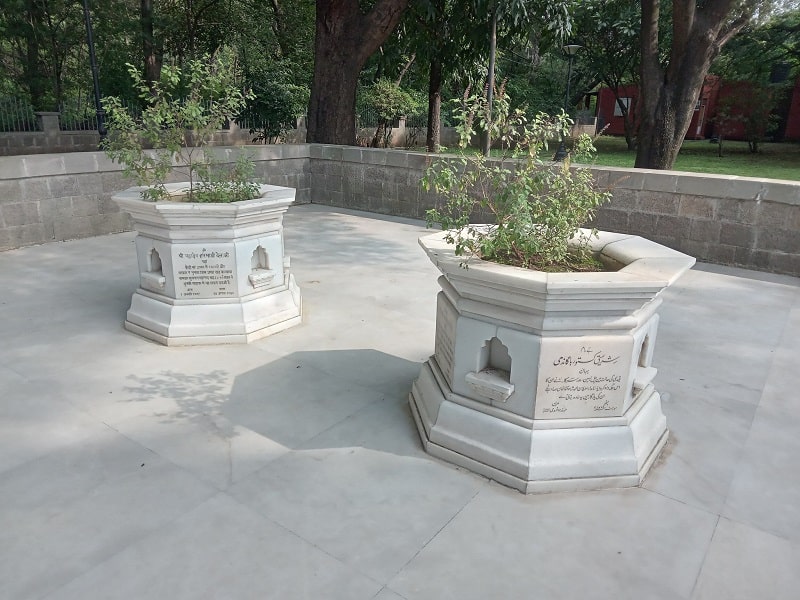
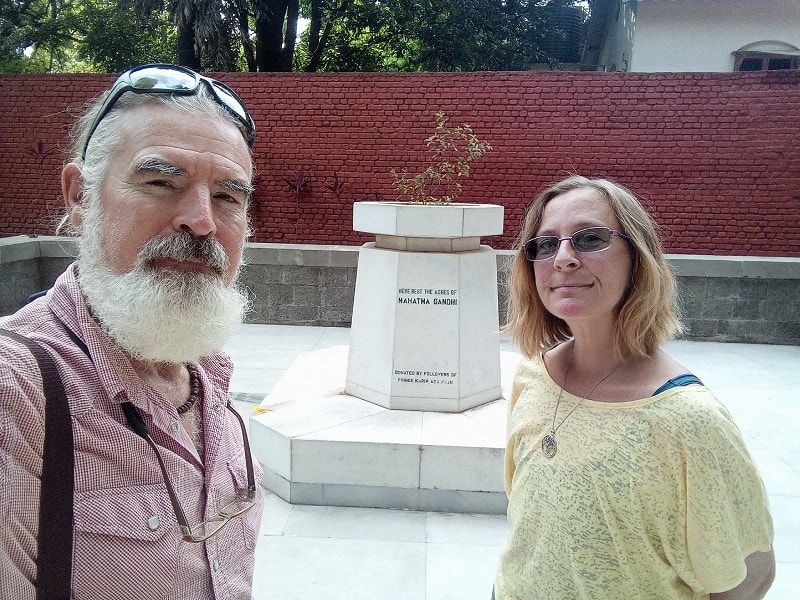
Also, a portion of Gandhi’s ashes are there. The memorials are low-key, on a separate, quiet part of the grounds, blocked off from the main park-like setting.
As memorial monuments go, it’s hardly anything special for a man so great. But that’s the point, isn’t it? After all, he always said, “My life is my message.”
Political ethics.
Happy birthday, Gandiji.
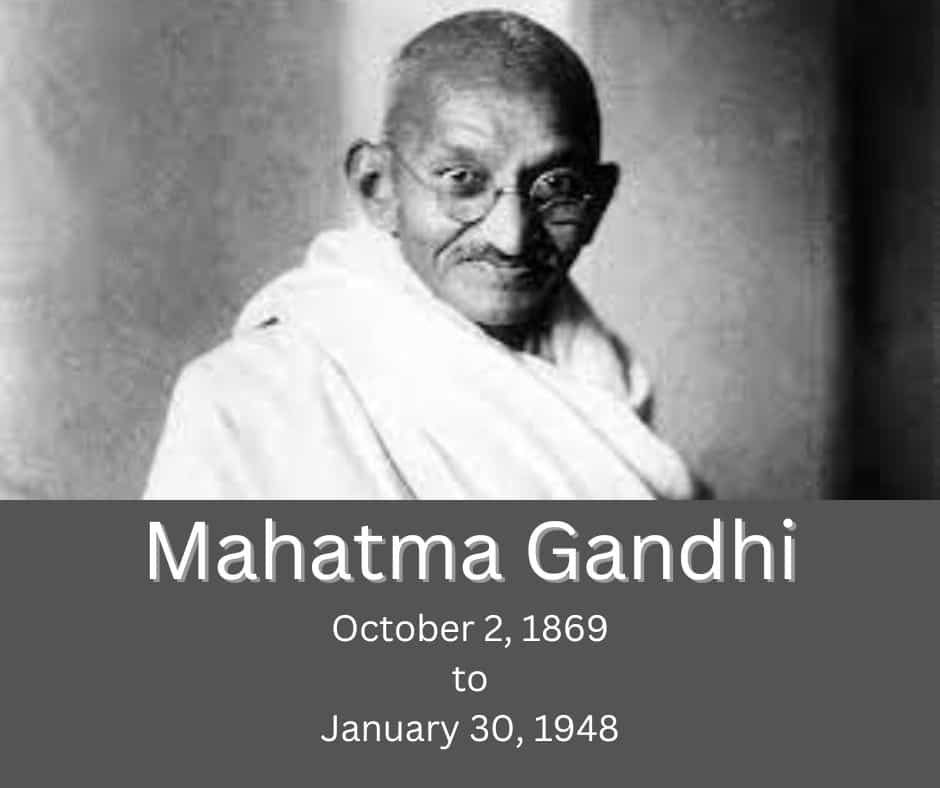
Thanks for reading, “Happy birthday, Gandhi.”
Other commentaries by Earth Vagabonds:
- Letter to a cruise ship company
- Why one language would benefit the world
- That time we saw a UFO in Mexico
- Pandemic walks with Ati soothe soul, seem surreal

